Iranian Musicians Hold Protest Rally After Attack On Students
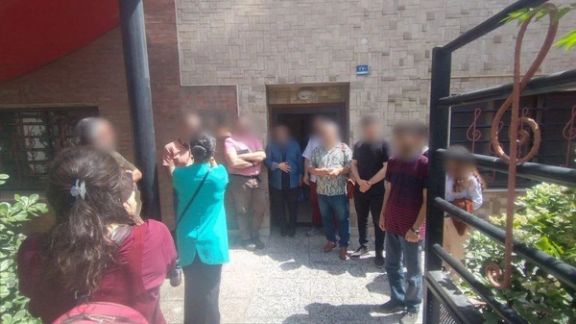
Iranian musicians have demonstrated outside the House of Music in Tehran in protest over security forces’ attack on students.

Iranian musicians have demonstrated outside the House of Music in Tehran in protest over security forces’ attack on students.
It follows the raid on Saturday on the University of Tehran’s Faculty of Fine Arts on the pretext of women not complying with the mandatory hijab.
Students and teaching staff were beaten up and some had their instruments broken.
On Monday, the board members of Iran House of Music slammed the violent behavior of security guards at the Tehran University faculty.
The Telegram channel of the Students' Union Councils reported that the security officers clashed with some female students. Demonstrators chanted slogans “Woman, Life, Freedom”, “Student Will Die, But Will Not Be Humiliated”, and “Death to the Leader”.
Iran's universities have been one of the main centers of protests during the nationwide uprising against the regime following the death of Mahsa Amini in police custody last year. In an attempt to suppress the demonstrations, the security forces of the Islamic Republic have repeatedly attacked the universities and arrested over 700 students.
The repression of the protesting students in recent months has provoked widespread criticism by human rights organisations and governments around the world.
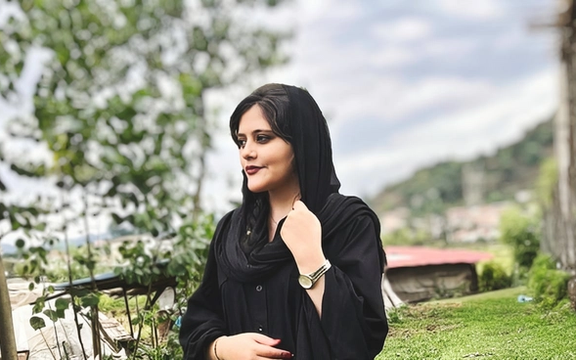
Streets in Vienna and Frankfurt are to be named after Mahsa Amini, whose death in custody last year sparked protests across Iran.
The decision in Vienna was announced by representatives of the governing Austrian parties SPÖ and Neos on Monday at a solidarity campaign.
This is the first street in the world to be named after Amini, the 22-year-old who died after her arrest by the morality police in Tehran for defying hijab rules.
The SPÖ and Neos will introduce a resolution at the upcoming municipal council meeting on May 24that calls for the nomination.
The two parties also demanded an immediate stop to executions in Iran and the abolition of the death penalty, along with the immediate release of political prisoners, an end to violence against the population and compliance with freedom of assembly and freedom of the press.
SPÖ municipal councilor Marina Hanke said: "Pictures have been going around the world for months, pictures of women in Iran who are taking their freedom, their rights and their space."
Dolores Bakos, spokeswoman for Neos in Vienna, said: "We must ensure that the cry of these courageous people for freedom, for democracy and respect for human rights does not go unheeded.”
In Frankfurt, mayor Narges Eskandari announced the city will change the name of the street where the Iranian consulate is located to Mahsa Amini.
Eskandari said from now on all correspondence to the consulate can bear Amini’s name, and even the consulate staff will have to write her name on their documents.
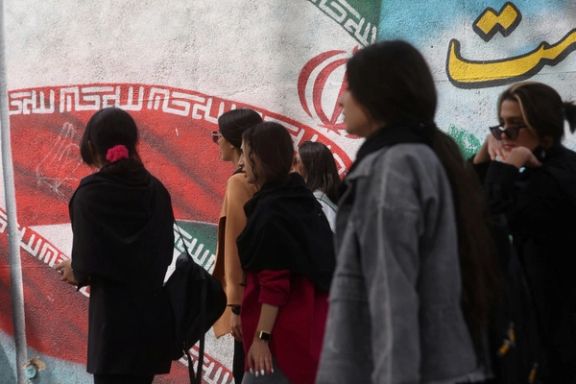
Iran's Cyber-Police (FATA) has threatened women fashion businesses, surgery clinics and gyms with closure over unveiled photos in their social media content.
Ramin Pashaei, deputy chief of FATA, said Monday Cyber Police aims at “clearing the [Persian language] cyberspace of immoral content” and warned that any social media content considered “outside norms and against moral standards” would bring about prosecution.
Authorities accuse boutiques, beauty salons, modelling agencies, gyms and plastic surgery establishments of encouraging women not to wear the hijab by their “immoral” content. FATA on some occasions in the past has prosecuted them or forced them to shut down their accounts.
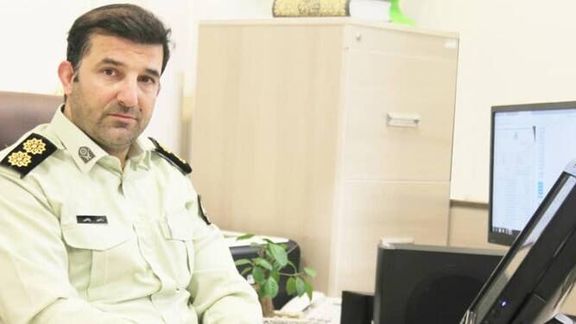
Last week an official of the “Basij-Militia of Retailers”, Gholamreza Hasanpour, told the semi-official Mehr News Agency that female sales staff should wear uniforms to work but have been given a “choice” of one hundred different designs to choose from.
Unveiled girl protesting against compulsory hijab by performing gymnastics on the streets of Boukan in western Iran.
Women’s defiance of hijab rules has a history as long as the Islamic Republic itself, but it has escalated to new levels since the death of 22-year-old Mahsa (Jina) Amini in custody of morality police for “improper hijab” sparked nationwide protests.
Protests gradually subsided after several months but defiance of hijab rules as a form of civil disobedience has forced the government to try to stop the anti-compulsory hijab movement by taking various measures.
Such measures include preventing defiant women from using public transportation, entering government offices and boarding planes, shutting down shops and shopping malls as well as various plans to “encourage and convince” them to wear the hijab such as billboards and banners extolling “hijab and chastity”.
One such banner put up by the ministry of Islamic Guidance and Tehran International Bookfair last week quoted the 19th century Russian writer Leo Tolstoy as saying that corruption, sexual derangement, and lack of hijab caused profusion of divorces in Europe. Another banner they have put up quoted 19th century French author Victor Hugo praising modesty of women and its allure for men.
“It's hilarious when you have to fake quotes from Tolstoy and Hugo about hijab because half of your own population is ignoring you,” London-based journalist Shayan Sardarizadeh tweeted.
Pressure on activists and prosecution of celebrity artists for defiance of hijab in public and through social media are among the other measures the regime has been employing to scare women into wearing the hijab.
Sepideh Rashno, a 28-year-old art student whose defiance of hijab rules and heated dispute with a hijab enforcer on a city bus landed her in prison in July last year, a few months before the Mahsa protests, was suspended from Alzahra University in Tehran due to "non-observance of the Islamic hijab" last week for two semesters.
"As a citizen, I have the right to choose the clothes I wear,” she wrote in response to the decision, adding that she planned to return to the university after her suspension “in my preferred outfit”, that is, unveiled.
Pundits have said the regime’s determination to reinforce strict hijab rules is political in nature. Vice President in Legal Affairs Mohammad Dehghan on Sunday confirmed such theories. “The Islamic Republic will not mean much if there is no hijab in the country,” he said.
On April 4 at a meeting with state officials Tuesday, Khamenei claimed that foreign intelligence services were encouraging Iranian women to disobey mandatory hijab.
“Discarding hijab is haram based on Sharia and also politically,” he declared. His declaration was a clear signal to authorities that they need to do anything it takes to re-establish control over women which has somehow waned following anti-regime protests.
“The order given by his excellency is clear,” Parliament Speaker Mohammad-Bagher Ghalibaf said a day after Khamenei’s speech while promising to give precedence to any hijab-related motion or bill.
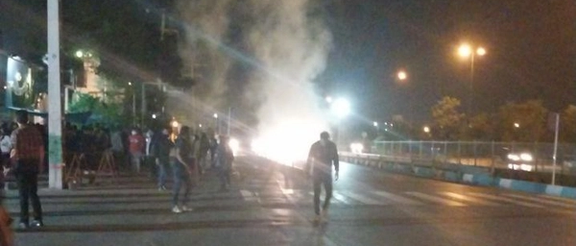
Iranians in the Islamic Republic and abroad have voiced their fears for three political prisoners whose execution is imminent.
Protestors gathered overnight outside the prison in Esfahan (Isfahan) where Majid Kazemi, Saleh Mirhashmi, and Saeed Yaqoubi await their death sentence, having been found guilty in a trial condemned as a travesty of justice by human rights campaigners.
They were convicted over the death of two IRGC’s Basij militia members and a police officer in protests of November last year, in what Persian media have dubbed the ‘Isfahan House’ case.
Responding to social media calls on Sunday night, people gathered outside Esfahan (Isfahan) Central Prison hoping to stop the executions. Videos posted by activists show dozens chanting slogans in front of the prison, while gunfire was also heard as thick smoke caused by teargas enveloped the area.
Following the increase in the executions of prisoners in recent weeks, families of those sentenced to death held a protest rally outside the Judiciary’s office in Tehran’s Keshavarz Street on Monday, demanding an end to the killing.
A similar rally was held last week outside Iran’s largest prison in Karaj hoping for mercy by the regime but by sunrise the prisoners were hanged.
Opposition activists say the death penalty is being used against the Isfahan House three as an intimidation tactic to stop further protests.

Campaigners say the prisoners were tortured into confessions, and there is no reliable evidence against them. According to an audio file released on Sunday of Kazemi talking to his cousin, he was coerced into confession by threats to his family of rape and death.
Exiled prince Reza Pahlavi tweeted on Sunday night, saying, “We must not allow this murderous regime to take another innocent life and turn another mother into a mourner.”
Prominent activist Masih Alinejad said: “We should not allow the regime of crime and madness to take more young people from us and make more families grieving.”
Canada-based dissident figure Hamed Esmaeilion, whose daughter and wife were killed in the shooting down of Flight PS752 by Iran’s Revolutionary Guard in 2020, tweeted, “When will the insanity stop? When will the free world stand behind its own values? How many more executions will it take for the world to stand up?”
Last week, Australian Senator Jordon Steele-John, a political sponsor of Majid Kazemi called on the Australian Foreign Minister Penny Wong “to have an urgent meeting with her Iranian counterpart to do all they can to prevent the execution of Majid, which could happen at any moment”.
Iranian expatriate communities plan demonstrations against the executions in cities worldwide on Saturday, May 20.
Iran has always had a high number of executions but the number started to rise after President Ebrahim Raisi – the former head of the country’s notorious judiciary -- took office in August 2021.
The United Nations said last week that Iran has executed 209 people so far this year, calling the record "abominable".

Demonstrators have gathered outside a jail in Iran overnight ahead of the feared execution of three anti-government protesters.
Videos posted by activists show dozens chanting slogans in front of the Isfahan Central Prison, while gunfire was also heard. The clips also show thick smoke caused by tear gas.
Iranian authorities intend to execute Majid Kazemi, Saleh Mirhashmi, and Saeed Yaqoubi.
The three detainees received the death penalty in connection with an armed attack on November 16on “Isfahan House” neighborhood last year.
The Iranian authorities claim that two members of the security forces and a police officer were killed by protesters.
Campaigners say the three men were tortured into confessions, and there is no reliable evidence against them.
Amnesty International on Saturday spoke of its fears for the fate of the three detainees.
The international human rights organisation said: “Majid Kazemi, Saleh Mirhashemi and Saeed Yaghoubi are at imminent risk of execution at central Isfahan prison (also known as Dastgerd prison) after Iran’s Supreme Court upheld their unjust convictions and death sentences in early May 2023.”
After a wave of nationwide anti-government protests last year which has still yet to subside, the Iranian regime has embarked on a wave of executions which has seen dozens of prisoners hanged this year.
The regime used overwhelming force with military weapons in its crackdown on the protests, killing more than 500 civilians. Hundreds of other protestors suffered permanent injuries, including the loss of eyes when shotgun pellets were fired at the faces of demonstrators. More than 20,000 people were arrested.
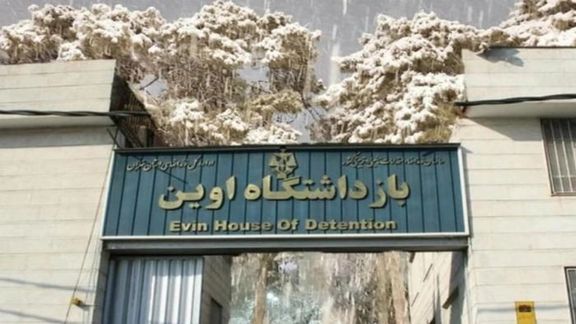
Iran's judiciary has been building cases against dozens of independent lawyers for representing dissidents and supporting the Women, Life, Freedom movement.
Iran International has learned that summoning lawyers to the Prosecutor’s Office in Tehran, which started in March, resumed last week after a pause due to the relocation of the prosecutor in charge.
The judiciary’s intelligence organization, sources in Iran said, is behind the prosecution of these lawyers most of whom had expressed their support for the Women, Life, Freedom movement on social media.
The case involves 170 lawyers of whom, sources told Iran International, 27 individuals from different parts of the country have already been summoned by the Evin prison prosecutor on charges of “propaganda against the regime” and “assembly and collusion with the intention of acting against [national] security”.
Iran International has also learned that lawyers who were summoned were forced to sign a pledge that implies acceptance of the charges. One of the two lawyers who refused to sign the pledge was detained for a few hours and another one for a few days.
UK-based lawyer and women’s rights activist Samaneh Savadi told Iran International that the regime is taking revenge on lawyers, many among whom volunteered to represent protesters. She said that the attorneys are being punished “for standing beside the people”.
Ali Mojtahedzadeh, one of the summoned lawyers, told Etemad newspaper Sunday that most of these lawyers had participated in the protests or voiced support on social media. He said he and some of his colleagues had received the letter to present themselves to the prosecutor in the past few days.
He pointed out that the cases against most of these lawyers were dropped following Supreme Leader Ali Khamenei’s “amnesty”, but now new charges have been brought against them.
In February, Khamenei agreed to a proposal by Judiciary chief Gholam-Hossein Mohseni Ejei to pardon some prisoners and reduce sentences for those arrested during antigovernment protests last year. The move appeared to be designed to show clemency after hundreds were killed and around 20,000 arrested, and to rescue the image of the regime amid a grim economic crisis and mass public rejection of Khamenei’s rule.
Another lawyer, Mitra Izadifar, told Etemad that she is being prosecuted again, after being pardoned earlier. She added that she has been summoned to Tehran although she lives and practices in Mashhad.
Mohammad-Hadi Jafarpour who practices law in Shiraz also told Etemad “I was once arrested on November 2 on charges of ‘propaganda against the regime’ and ‘assembly and collusion with the intention of acting against [national] security. At the time, I was mostly questioned by prosecutors about my media commentaries, [Instagram] posts, and tweets… I had to sign a pledge in order to be pardoned [by Khamenei].”
He added that he has also been summoned to Tehran by the Evin prosecutor although despite a legal requirement that says he should be prosecuted in his own city. Jafarpour pointed out that the summons letter he received did not mention the charges.
Earlier in March a Revolutionary court permanently deprived prominent lawyer Nemat Ahmadi, a member of the Union Internationale des Avocats or International Association of Lawyers, from practicing law in Iran.
Ahmadi, a former professor of law sacked from Azad University for his political activities and representing political prisoners, was sued by the intelligence ministry for the same reason.
Dissidents and protesters are often deprived of their right to choose their own lawyers and must accept defense attorneys the judiciary appoints from a government-trusted list.